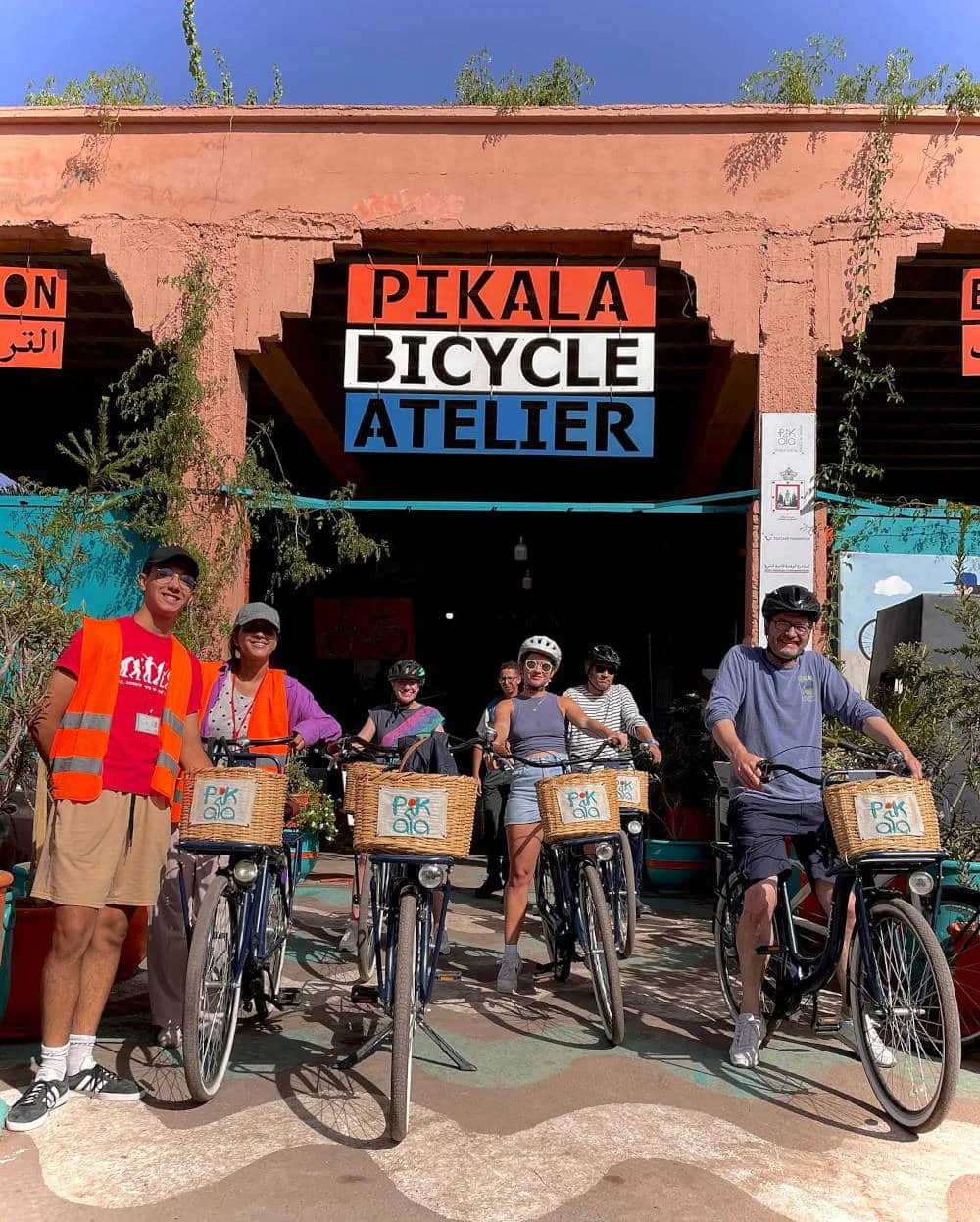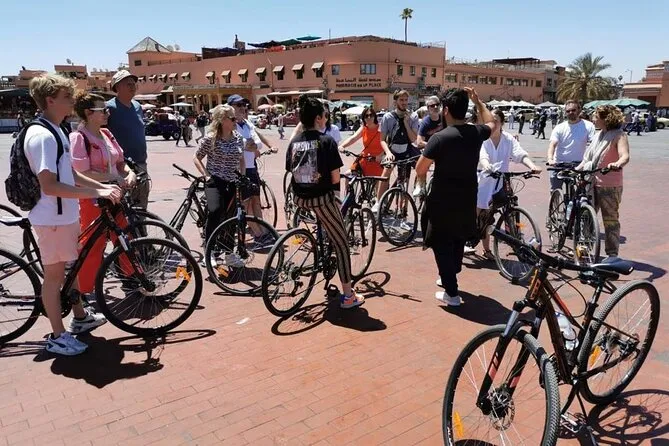When travelers first think of Marrakech, biking isn’t usually what comes to mind. Images of tight alleys, moped chaos, and a soundtrack of honks, neighs, and calls to prayer dominate expectations. But what if we told you that riding a bike here isn’t only possible—it’s one of the most immersive, inspiring, and eco-friendly ways to experience the city?
Let’s dive into what makes biking in Marrakech a surprisingly smart decision—and how Pikala Bikes is leading the way through social entrepreneurship and community-driven cycling tours.
Is Marrakech Bike-Friendly?
Here’s the honest truth: Marrakech isn’t Amsterdam. Traffic can be chaotic, and road rules feel more like guidelines than enforceable laws. In the Medina (the old city), alleyways are often filled with mopeds, pedestrians, cats, donkeys, bicycles, and carts. You’ll also need to adapt to the local energy, which is vibrant, fast-paced, and full of sensory stimulation.
But here’s the good news: Marrakech is almost entirely flat, which makes it a dream for cyclists once you understand the rhythm of the streets. And with the right route, equipment, and guide, you’ll feel confident, safe, and thrilled by the ride.
Why Choose a Bike Tour in Marrakech?
1. The City Is Bigger Than You Think
While the Medina is the heartbeat of Marrakech, the city stretches far beyond its walls. The new town of Gueliz offers art galleries and cafés; the Mellah (old Jewish quarter) reveals centuries of history; and areas like Hivernage and Sidi Ghanem add modern and industrial flair to the mix.
Even within the Medina, you're looking at 600 hectares (around 6 km²). Walking everywhere is possible, but you’ll soon discover that a bike allows you to explore more while expending less energy—especially under the Moroccan sun.
2. Sustainable and Smart
Opting for a bike over taxis or scooters reduces your carbon footprint. It also enables you to weave through side streets, explore quieter areas, and interact with the environment without adding noise or air pollution. For environmentally conscious travelers, this is a huge plus.
3. It’s a Cultural Connector
Biking brings you closer to the city's soul. You’ll hear kids laughing from rooftops, smell bread baking in traditional ovens, and pass artisans chiseling marble—all at eye level and with all senses engaged. You’ll go from being a spectator to a participant.
Meet Pikala: A Bike Tour with Purpose
The first structured bike tours in Marrakech were introduced by a Dutch entrepreneur with a vision: bring safe, social, and sustainable biking to a city that needed more mobility options. That vision became Pikala Bikes, a non-profit organization that’s now a cornerstone of responsible tourism in the city.
The founder began by rescuing old bikes from Amsterdam’s canals and shipping them to Morocco. With no storage space at first, she slept surrounded by bikes in her hostel room—an image that captures the project’s passion and grassroots energy.
Today, Pikala operates from a hub near Riad Laarouss, complete with a workshop, rental station, and community café.
What Makes Pikala Special?
- Social Impact: Pikala trains young locals in mechanics, hospitality, and tourism, giving them real employment paths.
- Eco-Tourism: Their routes are designed for low-impact travel and cultural sensitivity.
- Inclusivity: Pikala works on women’s empowerment, education, and community outreach, even distributing bikes in rural areas.
They offer tours in both French and English, with expert guides who are passionate about their city and stories.
What’s the Tour Like?
Expect the Unexpected
Your tour will avoid the overwhelming core of the souks or the crowded Jamaa El Fna Square. Instead, you’ll glide through quieter districts like:
- The Mellah: Once home to Marrakech’s Jewish community, this area is filled with spice markets and old synagogues.
- Gueliz: A modern, leafy district with Art Deco influences, French cafés, and local design shops.
- Bab Doukkala: A working-class district filled with daily life, vegetable markets, and stunning architecture.
- Medina side-streets: Calm, untouristy alleys where locals go about their day.
The pace is easygoing and accessible to most fitness levels. The guides ensure that the routes avoid bottlenecks and danger zones, like the tanneries or core souks, where biking would be both inconvenient and inconsiderate.
What Will You Learn?
Guides share a blend of history, personal anecdotes, and local wisdom. You’ll learn about architectural styles, colonial influence, urban planning, and even bike culture in Morocco. The narrative style is relaxed, friendly, and occasionally humorous.
While a few historical claims may lean toward legend more than fact, the spirit of storytelling makes every stop enjoyable. And guides are always open to questions and friendly chats.
More Than Just a Tour: Pikala’s Broader Impact
Pikala isn’t just guiding tourists—it’s building futures. Here’s how:
- Vocational Training: Youth are taught how to repair bikes, run a rental shop, and guide tours in multiple languages.
- Women in Biking: The project encourages girls to cycle and educates families on safe urban mobility for women.
- Community Café: A hub near Bab Doukkala offers drinks like mint lemonade or hibiscus “bissap” and a place for locals and visitors to connect.
- School Programs: Pikala delivers workshops on road safety and donates bikes to school children in need.
Safety Tips for Biking in Marrakech
- Wear a helmet—even if locals don’t, it’s wise.
- Follow your guide closely; they know the safest paths.
- Stay hydrated. Marrakech is hot, even in spring.
- Use sun protection: sunscreen, hats, or long sleeves.
- Respect pedestrians and always slow down in tight areas.
Who Is This Tour For?
- Solo travelers looking to experience Marrakech through a new lens.
- Couples seeking a romantic and different kind of date.
- Families with teens who love adventure and culture.
- Eco-conscious tourists supporting green travel.
- Anyone curious about local life beyond the tourist trail.
When, Where, and How Much?
Start Location: Pikala Workshop, near Riad Laarouss
Café: Pikala Café near Bab Doukkala
Duration: 2.5 to 3 hours
Languages: English and French
Price: Around €20–€25 per person
Booking: Book ahead during high season (October–April)
What to Bring:
- Comfortable, breathable clothes
- Water bottle (though water is provided)
- Sunglasses or a hat
- Camera or smartphone
- Closed-toe shoes or sandals with a heel strap
Final Thoughts: The Joy of Two Wheels in Marrakech
Marrakech isn’t just about riads, couscous, and bazaars. It’s a living, evolving city with stories to tell—and a bike tour with Pikala is one of the best ways to hear them. You’ll get off the beaten path, connect with real people, and leave with not just photos, but genuine memories.
And just maybe, you’ll return home wanting to swap your Uber app for a secondhand Dutch bike. We wouldn’t blame you.
So, is biking in Marrakech a good idea?
Absolutely. It might just be the highlight of your trip.
For a comprehensive and detailed guide to exploring Marrakech, be sure to check out our Marrakech Travel Guide: All You Need to Know . It covers everything from where to stay and what to eat, to the best activities and practical travel tips, making it the perfect companion for your trip to this vibrant city.







